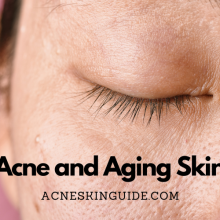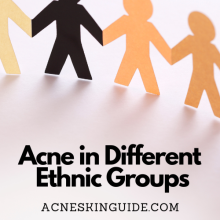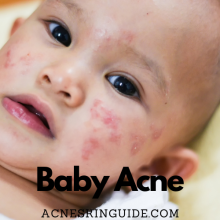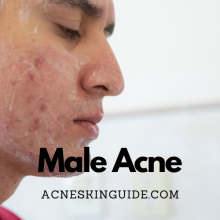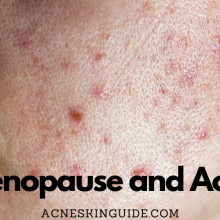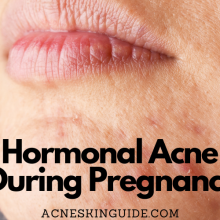Adult Acne in Women | Acne Skin Guide
Adult acne is a prevalent issue for many women beyond their teenage years, impacting their emotional well-being and self-esteem. Hormonal fluctuations, stress, genetics, medications, and lifestyle factors contribute to adult acne. Treatments range from topical retinoids, benzoyl peroxide, and antibiotics to oral medications like birth control pills, spironolactone, and isotretinoin for severe cases. Natural remedies like tea tree oil and honey offer gentler alternatives.
Self-care strategies, including an acne-friendly skincare routine, stress management, and dietary changes, can also help manage adult acne. Consulting a dermatologist is crucial for persistent or severe cases, and women of color may face unique challenges like hyperpigmentation. With the right approach, combining treatments and self-care, women can regain confidence and effectively manage their adult acne.
#1 Recommended Acne Treatment | #2 Recommended Acne Treatment |
 |  |

Breaking the Cycle: Understanding and Overcoming Adult Acne for Women
Acne is often associated with adolescence, but the truth is, many women continue to battle with this frustrating and confidence-sapping condition well into their 20s, 30s, and beyond. Adult acne is a prevalent issue that can have a profound impact on a woman’s emotional well-being and self-esteem. While the causes and triggers may vary, there are effective treatments and coping strategies available to help women manage their adult acne and regain their confidence.
Causes of Adult Acne in Women
Hormonal fluctuations are a significant contributing factor to adult acne in women. During the menstrual cycle, pregnancy, and perimenopause, hormonal shifts can trigger or exacerbate breakouts. Conditions like polycystic ovary syndrome (PCOS) and thyroid disorders, which can cause hormonal imbalances, may also lead to adult acne.
Stress is another major culprit behind adult acne. When the body is under stress, it produces higher levels of cortisol, a hormone that can stimulate oil production and clog pores, leading to breakouts. Genetics also play a role, with some women being more predisposed to adult acne due to their family history.
Certain medications, such as corticosteroids, lithium, and certain birth control pills, can contribute to adult acne. Additionally, cosmetic products and hair products that are comedogenic (pore-clogging) can exacerbate the problem.
Lifestyle factors, such as an unhealthy diet, lack of sleep, and smoking, can also trigger or worsen adult acne. Environmental factors like pollution, humidity, and exposure to certain chemicals or materials can also contribute to breakouts.
Treatments for Adult Acne in Women
Topical treatments are often the first line of defense against adult acne. Retinoids (like tretinoin and adapalene) can help unclog pores and promote cell turnover. Benzoyl peroxide and salicylic acid are effective in killing acne-causing bacteria and drying out excess oil. Antibiotics like clindamycin and erythromycin may also be prescribed to reduce inflammation and fight bacterial infection.
Oral medications can be prescribed for more severe or persistent adult acne. Birth control pills that contain estrogen and progestin can help regulate hormones and reduce acne. Spironolactone, an anti-androgen medication, can also help by blocking the effects of male hormones that contribute to acne. Isotretinoin (formerly known as Accutane) is a powerful oral medication that is reserved for severe cases of adult acne that have not responded to other treatments. However, it does come with potential side effects and requires close monitoring by a dermatologist.
For those seeking gentler, natural alternatives, remedies like tea tree oil, green tea, aloe vera, honey, and apple cider vinegar have shown promise in treating adult acne. However, it’s important to consult with a dermatologist before trying any new natural remedies, as some may cause adverse reactions or interact with other medications.
Coping Strategies and Self-Care
In addition to medical treatments, implementing self-care strategies can be incredibly beneficial for women dealing with adult acne. Developing an acne-friendly skincare routine that avoids pore-clogging ingredients and includes gentle, non-comedogenic products is crucial. Using makeup strategically to camouflage blemishes while allowing the skin to breathe can also help boost confidence.
Managing stress through techniques like meditation, yoga, or counseling can help reduce the hormonal imbalances and inflammation that contribute to adult acne. Following an acne-friendly diet rich in antioxidants, omega-3 fatty acids, and low in processed foods and dairy can also make a difference.
For those struggling with acne scarring or discoloration, treatments like chemical peels, microneedling, and laser therapies can help improve the appearance of scars and promote smoother, more even-toned skin.
When to See a Dermatologist
If over-the-counter treatments and lifestyle changes aren’t effective in managing adult acne, or if the acne is severe, persistent, or causing scarring, it’s time to consult a dermatologist. A dermatologist can provide tailored treatment plans, prescribe stronger medications if necessary, and offer guidance on managing adult acne.
When visiting a dermatologist, it’s important to be prepared with questions, photos documenting the progression of your acne, and an understanding of the different types of dermatologists (e.g., cosmetic, medical) and their areas of expertise.
Adult Acne in Women of Color
Women of color may face unique challenges when it comes to adult acne. Certain skin tones are more prone to hyperpigmentation, or dark spots and discoloration, as a result of acne lesions. Cultural perspectives and stigma surrounding acne can also impact a woman’s emotional well-being and willingness to seek treatment.
Dermatologists who specialize in treating skin of color can provide tailored advice and treatment plans that address the specific needs and concerns of women of color with adult acne.
Adult Acne and Pregnancy
Hormonal shifts during pregnancy and the postpartum period can often trigger or worsen acne breakouts. While some acne treatments may be safe during pregnancy, others can pose risks to the developing fetus. It’s crucial for pregnant women or those planning to become pregnant to discuss safe treatment options with their obstetrician or dermatologist.
Conclusion
While adult acne in women can be a frustrating and confidence-sapping condition, it is manageable with the right approach. By understanding the underlying causes, exploring appropriate treatments (both medical and natural), and implementing self-care strategies, women can take control of their adult acne and regain their self-confidence.
It’s important to note, however, that some treatments may come with potential side effects or risks. Oral medications like isotretinoin require close monitoring by a dermatologist, and natural remedies should be approached with caution, as some may cause adverse reactions or interact with other medications.
Additionally, while self-care strategies like stress management and dietary changes can be beneficial, they may not be a one-size-fits-all solution, and some women may require more targeted medical interventions.
Ultimately, the key to successfully managing adult acne in women is a combination of patience, persistence, and a willingness to work closely with a dermatologist or healthcare provider to find the right treatment plan. With the proper support and guidance, women can overcome the challenges of adult acne and embrace their natural beauty with confidence.
#1 Recommended Acne Treatment | #2 Recommended Acne Treatment |
 |  |
Summary and FAQs
Can hormonal birth control help treat adult acne in women, and what are the potential side effects?
Yes, hormonal birth control can help treat adult acne in women. Birth control pills that contain estrogen and progestin can help regulate hormone levels and reduce acne breakouts. The exact mechanism is not fully understood, but it’s believed that the estrogen in birth control pills suppresses the production of androgens (male hormones) like testosterone, which can contribute to acne by increasing oil production and clogging pores.
However, it’s important to note that not all birth control pills are equally effective in treating acne, and some formulations may even worsen acne in some women. Your doctor can recommend a birth control pill formulation that is more likely to improve acne based on its hormonal composition.
As for potential side effects, these can vary depending on the specific birth control pill and an individual’s unique response, but some common side effects may include:
- Nausea
- Breast tenderness
- Headaches
- Irregular bleeding or spotting (especially in the first few months)
- Weight gain or fluid retention
- Mood changes
- Decreased libido
In rare cases, birth control pills can also increase the risk of blood clots, especially in women who smoke or have other risk factors. It’s essential to discuss your medical history and any concerns with your doctor before starting hormonal birth control for acne treatment.
How does adult acne differ from teenage acne in terms of causes, presentation, and treatments?
Adult acne differs from teenage acne in several ways:
Causes:
- Teenage acne is primarily driven by hormonal changes during puberty, which increase oil production and clog pores.
- Adult acne can be caused by a variety of factors beyond just hormones, such as stress, genetics, medications, cosmetic products, and underlying medical conditions like PCOS.
Presentation:
- Teenage acne typically appears on the face, back, and chest.
- Adult acne often affects the lower face, jawline, and neck area more than the forehead and other areas.
- Adult acne lesions may be more inflammatory, with more cystic bumps rather than just blackheads and whiteheads.
Treatments:
- Over-the-counter topical treatments like benzoyl peroxide and salicylic acid are often the first line of defense for both teenage and adult acne.
- For adult acne, hormonal treatments (like birth control pills or spironolactone) are more commonly used to address the hormonal component.
- Oral isotretinoin (formerly Accutane) may be prescribed for severe, cystic adult acne that doesn’t respond to other treatments.
- Adult acne treatments also focus more on addressing potential triggers like stress, diet, and skincare routines.
Overall, while both involve clogged pores and inflammation, adult acne tends to be more persistent, hormonally-influenced, and may require more targeted treatments compared to typical teenage acne.
Are there any specific dietary changes or supplements that can help reduce adult acne in women?
Yes, certain dietary changes and supplements may help reduce adult acne in women:
Dietary Changes:
- Low-glycemic diet: Following a diet low in refined carbs and sugars can help regulate blood sugar and insulin levels, which may reduce acne.
- Increased intake of omega-3s: Foods rich in omega-3 fatty acids like salmon, walnuts, and chia seeds have anti-inflammatory properties that could improve acne.
- Avoiding dairy: Some studies suggest that cow’s milk and dairy products may aggravate acne due to hormones and inflammatory compounds.
- More fruits and vegetables: A diet high in antioxidant-rich fruits and veggies can counter oxidative stress and inflammation linked to acne.
Supplements:
- Zinc: Zinc supplements may help reduce acne by regulating hormone levels and decreasing oil production.
- Omega-3 fish oil: Fish oil supplements provide anti-inflammatory omega-3s that could improve acne.
- Probiotics: Probiotic supplements may help regulate gut health, which is linked to inflammation and acne.
- Vitamin D: Some research indicates vitamin D deficiency may worsen acne, so supplementation could be beneficial.
- DIM (Diindolylmethane): This compound found in cruciferous veggies may help balance hormones that contribute to acne.
However, it’s crucial to consult a dermatologist before starting any new supplement regimen, as they can interact with medications or cause side effects in some people. Dietary and lifestyle changes should be combined with appropriate medical treatments for best results.
What are the long-term effects of adult acne on self-esteem and mental health, and how can women seek support for these issues?
Adult acne can have significant long-term effects on a woman’s self-esteem and mental health if not properly managed and supported.
Self-Esteem:
- Acne can lead to feelings of embarrassment, self-consciousness, and low self-worth, especially when it occurs in adulthood when most expect clear skin.
- The visible nature of acne can make some women feel unattractive and negatively impact their body image.
- This lowered self-esteem can affect multiple areas of life, including social situations, romantic relationships, and career aspirations.
Mental Health:
- Adult acne is linked to higher rates of depression, anxiety, and lower overall life satisfaction.
- The frustration of dealing with persistent acne despite trying various treatments can lead to feelings of hopelessness.
- Acne’s effects on appearance can strain emotional well-being and increase social isolation in some cases.
- Preoccupation with skin issues can be a symptom of body dysmorphic disorder in severe cases.
To seek support, women can:
- Talk to a dermatologist about treatment options to effectively manage their acne.
- Consult a therapist or join a support group to process negative feelings about their appearance in a healthy way.
- Practice self-care activities that boost confidence beyond appearance.
- Lean on loved ones for emotional support and empathy.
- Follow body-positive social media accounts that promote self-love.
- Consider mindfulness practices like meditation to reduce stress and negative self-talk.
It’s important for women to not battle adult acne alone. With comprehensive treatment, self-compassion practices, and a strong support system, the emotional impacts can be mitigated over time.
How does adult acne impact intimate relationships, and what advice can be given for managing this aspect?
Adult acne can certainly impact intimate relationships in several ways:
- Self-Consciousness: Many women with adult acne may feel self-conscious or embarrassed about their appearance, which can affect their confidence and willingness to be intimate with a partner.
- Intimacy Avoidance: In some cases, women with severe acne may avoid intimacy altogether out of fear of their partner seeing their skin up close or being judged.
- Impact on Self-Esteem: The emotional toll of adult acne can lead to lowered self-esteem, which can make it difficult to feel desirable or worthy of a fulfilling intimate relationship.
- Strain on Communication: If left unaddressed, feelings of insecurity due to acne may create challenges in openly communicating with a partner about physical and emotional needs.
To manage the impact of adult acne on intimate relationships, here are some suggestions:
- Open Communication: Have an honest discussion with your partner about your acne concerns. A supportive partner can provide reassurance and help you feel more comfortable.
- Focus on Non-Physical Intimacy: Explore forms of intimacy beyond physical appearance, such as emotional connection, quality time together, and shared experiences.
- Seek Professional Help: Consider individual or couple’s counseling to work through self-esteem issues, improve communication, and strengthen emotional intimacy.
- Practice Self-Love: Engage in self-care activities that boost your confidence and remind you of your inherent worth beyond your skin.
- Be Patient and Persistent with Treatment: Consistently follow your dermatologist’s recommendations to effectively manage your acne over time.
By fostering open and honest communication, focusing on emotional intimacy, and actively working on self-acceptance, women with adult acne can build and maintain fulfilling intimate relationships despite their skin concerns.

